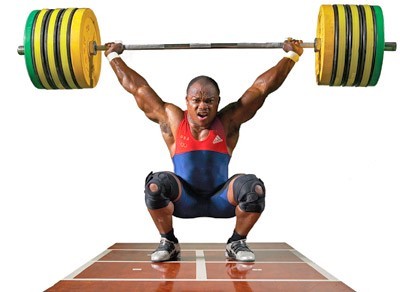I went to my brother’s Olympic Lifting competition a few years ago. After listening to the Tim Ferriss Podcast with strength coach Pavel Tsatsouline, I was reminded of some things I observed there. Here they are:
Practice, don’t workout.
Pavel calls workouts “practice”. The goal, he says, is not to work until you burn out but to focus on the daily practice. What we call something affects how we approach it. When we call something “work”, we perceive it as such. When we call it “practice”, we choose to approach it with more curiosity, patience, and interest.
Rather than going to work, consider it training your business skills. Rather than shopping for groceries, call it practice for making healthy choices. Names are just labels someone else created. You can change them to better suit your goals.
“Strength is a skill. Training must be approached as a practice, not a workout. You will practice everyday.” — Pavel
Everything starts with mindset.
So much of weightlifting is the moment before the lift. What is the athlete’s state of mind in that moment? Are they thinking about something else? Worried the weight is too heavy? Concerned their grunting is too loud? Athletes want to be in a flow state to perform at their best. To get there, the mind must be clear of distractions and limiting beliefs. That’s not easy. It takes consistent practice to develop that mindset. For weightlifters, that means getting in the reps.
“When I train, I erase all the limits and expectations of what I can do. I am powerful and anything is possible.” — Camille Leblanc-Bazinet
It’s all about reps.
To increase your strength, you need to lift consistently. That means showing up day after day and spending time under the bar. Repetition, with patience, leads to mastery. Weightlifters talk about reps and the concept applies to any skill you want to master. Your growth is a direct result of focused, consistent practice.
“If you think you are only strong if you can lift a certain number, whatever that number is, you will feel pretty weak most of the time. Strength is not a data point; it’s not a number. It’s an attitude.” — Pavel

Focus on two lifts.
The Olympic Lifting competition has only two lifts: the snatch and the clean and jerk. Athletes focus on mastering those two movements. Everything else is secondary or entirely dismissed. As Pavel says, training is like a budget. You only have so many funds to spend, so you need to make choices where to invest. The more you invest in one thing, the better you can be at it.
“Typically the world’s best athletes are minimalists when it comes to their training. They work hard and fast with few exercises. They master the fundamentals and work with them for years. This is the secret that no one wants to hear.” — Greg Glassman
Start slow to go fast.
While everyone had their own pre-lift routine, all athletes paused a moment before they began the lift. The pause allows the mind to clear and the body to set, creating a strong foundation to support the explosive movement that follows. As I heard someone there say, you must start slow to go fast. When lifting weights, this is true. When starting to workout or learning a new skill, this is also true. Start slow with the basics. Practice the form. Master it. Develop a strong foundation. Then your growth can pick up speed and intensity.
“Mentally prepare for a steady, relentless effort, as opposed to having a speed mindset” — Pavel
Never match your PR.
If you want to increase your PR (Personal Record), never try matching it. You already know you can lift it, so aim higher, even if it’s just by 1lb. This will create slow, steady, and consistent improvement. We often limit ourselves based on our previous accomplishments. Those, we think, are our peak and we strive to reach them again. Aim instead to exceed them.
“I learned something from all those sets and reps when I didn’t think I could lift another ounce of weight… I learned that we are always stronger than we know.” — Arnold Schwarzenegger
Practice from a handicap.
I overheard coaches talking about Russian athletes who run 2–3 miles, do squats, then train. When they later compete with fresh legs, it’s easy. It’s like the tightrope walker who practices backward and blindfolded so the performance is easy. This can apply to any type of performance, whether it be a sporting event, public speaking, or even your confidence at the office. Make practice more challenging so the performance will be easy by comparison.
“The human body is an incredible machine, but most people only get out of that machine what their mind allows them to.” — Rich Froning
You find strength within.
It’s silly, in a way, to strip weightlifting down to its naked form: fighting against gravity. Can I lift this object and push it with more force than nature pushes back? If yes, then add more weight and repeat. There is no end. You just keep adding weight until the bar wins. Week after week. Year after year. It’s a lifetime of fights against an unbeatable force.
An outsider might wonder, why fight then? To athletes, the real fight is internal. To confront the bar is to confront yourself — your identity, your self-worth, your purpose. You must search within for strength. There is nothing else to draw from. What you find teaches you about yourself.
Each victory is a reminder of your power.
“At the peak of tremendous and victorious effort, while the blood is pounding in your head, all suddenly becomes quiet within you. Everything seems clearer and whiter than ever before, as if great spotlights had been turned on. At that moment, you have the conviction that you contain all the power in the world, that you are capable of everything, that you have wings. There is no more precious moment in life than this, the white moment, and you will work very hard for years just to taste it again.” — Yuri Vlasov
And each failure is a lesson in humility. The bar doesn’t care if you’re Arnold Schwarzenegger or a first-time lifter. It treats everyone the same.
“I have found the Iron to be my greatest friend. It never freaks out on me, never runs. Friends may come and go. But two hundred pounds is always two hundred pounds.” — Henry Rollins
The bar does not create limits for you; it is just your tool for feeling the limits that already exist. To challenge those limits once is hard. To do it daily is physically, mentally, and emotionally exhausting. And yet weightlifters eagerly step up to the bar again and again, knowing it will not only build physical strength, but mental fortitude and emotional resilience. They know the fight will make them tougher.
We would all be fortunate to approach the bars in our lives with the same attitude. Approaching that bar is tough. Waking up each morning is tough. Dealing with the day’s rude, upset, unhappy people is tough. Responding to every adversity that might ruin your day is tough.
Approach anyway. Every approach is a rep, and every rep is a chance to practice your skill, develop your mindset, and build the toughness to approach again tomorrow.
Originally published at betterhumans.coach.me


